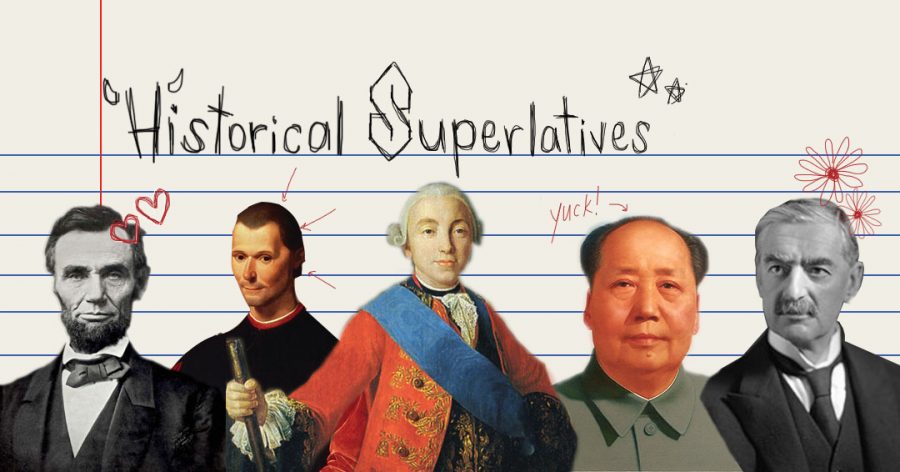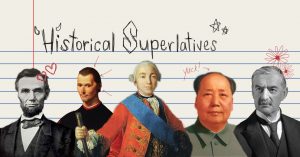Historical Superlatives
Three history teachers rank historical figures in a list of superlatives.
November 8, 2019
It may seem like seniors are the only ones who get recognized for their conquests and legacy at the school throughout the year, but that is no longer the case. Although dead, notable people and leaders in history should still be recognized. With the help of three history teachers and six superlative categories, those who are not part of the 2020 graduating class have a chance to be recognized. Among this list are leaders and legends who are talked about at Cedar Park High School every day. Buckle up and get ready for historical superlatives!
To start us off is Josh Marsh who teaches AP and on-level U.S. History with his picks for American superlatives:
Most relevant to present day/impactful: Abraham Lincoln
The 16th president and man responsible for the abolition of slavery is Marsh’s pick for most impactful historical figure for good reason.
In fact, the Encyclopedia Britannica would likely support this selection,
“In [Lincoln’s] view, the Union was worth saving not only for its own sake but also because it embodied an ideal, the ideal of self-government.”
“His legacy [involving slavery and other achievements] still carries on today,” Marsh said.
Least likely to succeed: Aaron Burr
In the era of the founding fathers, Aaron Burr seemed to have tried his hardest to go down in history with a positive influence. While he helped shape the constitution, there were also a number of unsavory deeds he performed which hindered this achievement.
“[Burr] never became president, killed [Alexander] Hamilton, and was actually put on trial for treason,” Marsh said.
Despite his efforts otherwise, Burr’s legacy may be one of failure rather than acclaim, at least in the rankings of Marsh’s superlative selections.
Class clown: Lyndon B. Johnson
The 36th president of the United States earned his spot as class clown thanks to his huge sense of humor according to Marsh.
In fact, this claim is supported by the Encyclopedia Britannica which states that, in addition to his interest in politics, Johnson also had a “crude, occasionally scatological sense of humor.”
For further clarification, Oxford Dictionary defines ‘scatological’ as “relating to or characterized by an interest in excrement and excretion”
Most deadly: John Wilkes Booth/Lee Harvey Oswald
These two men may not have been deadly in numbers but certainly in influence. John Wilkes Booth, the assassin of Abraham Lincoln,was a conspirator for the Confederacy.
According to History.com, “many newspapers, even in the South, expressed dismay and sympathy over Lincoln’s assassination. Booth was shocked the papers described him as a ‘common cutthroat’ rather than a hero.”
Additionally, Lee Harvey Oswald’s assassination of president John F. Kennedy caused a similar uproar. According to the Encyclopedia Britannica, after joining the Marines, Oswald “began expressing pro-soviet and politically radical views and…tried unsuccessfully to become a citizen of [the Soviet Union].”
It was these ideals that are said to have motivated Kennedy’s assassination.
Most gullible: General Charles Cornwallis of Britain
During the American revolution, tensions ran high while espionage, false information, and a ruthless fight for a country ensued. In a clever media ploy to hide the route of the Union, newspapers printed false stories.
“[Cornwallis] believed the stories in the newspapers that Washington was remaining in New York” Marsh said, “but he was actually marching to Yorktown to end the war.”
This mistake proved to be detrimental to the general and cost him victory as Washington seized Yorkton and ended the war there in 1783.
Biggest flirt: Benjamin Franklin
“It was well known that he was not faithful,” Marsh said.
In fact, he even penned a letter called “Advice to a Young Man on the Choice of a Mistress” which, while intended to be humorous and often paired with another essay of his entitled “Fart Proudly,” likely confirms his unchaste reputation.
Next up is Kirstin Aguilar, a powerhouse who teaches AP World History and AP European History. Here are her specialties in AP Euro picks:
Most relevant to present day/impactful: Niccolò Machiavelli
Merriam-Webster Dictionary defines Machiavellianism as “the view that politics is amoral and that any means however unscrupulous can justifiably be used in achieving political power”
Aguilar effectively summarizes this definition, “Machiavelli’s ideas suggest that it’s good to be loved but it’s better to be feared than loved. We see a lot of this in politics, too, a ‘might makes right’ type of thing.”
Least likely to succeed: Weimar Republic
This 20th century Republic was a brief governing body in Germany that survived for only twenty two years from 1911 to 1933.
The Weimar republic’s downfall is largely attributed to hyperinflation after their raw materials were taken over by other countries after World War I. Because of this, the Weimar Republic controlled Germany struggled to pay war debts and simply printed more money.
This idea destroyed the value of German currency at the time, and unfortunately, according to History. com “the Weimar Republic experienced enough chaos to position Germany for the rise of…the Nazi Party”
Once economically vulnerable, Aguilar said that they were set up in a way that kind of doomed them for failure, from the beginning they were being attacked from all sides.
Class clown: Peter III of Russia
This young Russian leader with loyalty to Russia’s enemy was a widely disliked ruler in his country and could certainly be described as immature, confirming his class clown status.
“Peter III was Catherine the Great’s husband for a very short amount of time. He was very childlike and when he got married, he wanted to play toy soldiers with her,” Aguilar said. “He wasn’t exactly the strongest leader and he ended up ‘mysteriously’ dying before [Catherine] took over.”
The Encyclopedia Britannica confirms this superlative, describing Peter as someone who seemed to contradict and attempt reverse many well-established treatises and institutions. “[He] made peace with Prussia and withdrew from the Seven Years’ War…offended the Russian Orthodox Church by trying to force it to adopt Lutheran religious practices…and alienated the imperial guards by making their service requirements more severe and threatening to disband them.”
Most deadly: Conquistadors/Joseph Stalin
Through their conquest of the Americas, Conquistador leader Hernán Cortés decimated multiple native American civilizations. Conquistadors overtook a resounding amount of native land causing death in magnitudes during the process.
“The Conquistadors spread disease when they conquered the Americas and it killed off a large part of the population,” Aguilar said.
Additionally, Aguilar included former Russian leader Joseph Stalin as most deadly in tandem with the Conquistadors.
“Stalin purposely killed a lot of people because of his policies,” Aguilar said.
Most gullible: Chamberlain
“He was the leader of Great Britain when Hitler was rising to power,” Aguilar said.“It’s called the Policy of Appeasement- he kept making agreements with Hitler, just trusting that Hitler would not continue to invade people and of course, we know he did.”
The Encyclopedia Britannica elaborates on the situation specifically with Czechoslovakia, “By the Munich Agreement, [Chamberlain]…granted almost all of Hitler’s demands and left Czechoslovakia defenseless. Hitler seized…Czechoslovakia” despite the agreement.”
Biggest flirt: Henry VIII
Henry VIII’s promiscuity has secured his spot as AP Euro’s biggest flirt.
“He had six wives,” Aguilar said. “He had lots of different wives and women and a lot of them didn’t last very long”
In fact, according to History.com, “His desire to annul his first marriage without papal approval led to the creation of a separate Church of England. Of his marriages, two ended in annulment, two in natural deaths, and two with his wives’ beheadings for adultery and treason.”
Finally, AP World History teacher, Cross Country coach and Girl’s Soccer coach Jeff Gamble discusses his picks for World History.
Most relevant to present day/impactful: XYZ Affair
“[The XYZ affair was] pretty obscure original scandal with John Adams,” Gamble said. “The democrats contacted the French to…interfere in our political process. It’s kind of similar [to present day issues] but very 1700s obscure”
As for relevancy to the superlative, Gamble said the colonial conspiracy is similar to current events involving the U.S. president allegedly consulting the Ukranian government for information on a political opponent in an interesting repetition of history.
Least likely to succeed: The Russian government
“Russian history is pretty tragic,” Gamble said. “They have a lot of epic failures and epic mistakes but in a way they make it seem heroic and it shows how really tough common people are that they’ve been through this. I don’t want to offend any Russians…they’re pretty tough.”
The Russian government has historically proved unsuccessful in a number of efforts often at the expense of its own people, especially with the fall of the USSR in the late 20th century.
“But the Russians can always throw down, they saved the world by defeating Hitler, that’s a pretty good win,” Gamble said. “[Otherwise] they’re a very serious, tragic culture.”
Class clown: Mao Zedong’s rise to power
“It’s so unfunny that it’s funny…the whole story of Mao Zedong and his rise to power, the long march, the rewriting of history, the great leap forward, and the cultural revolution where 16 year old kids take over the country,” Gamble said.
China’s cultural revolution began in 1966 and was caused by Mao Zedong.
“I mean, you couldn’t write a more bizarre story- You almost have to laugh at how insane it is,” Gamble said. “But then again, at the same time that all these things are occurring, millions of people are suffering and dying. Mao Zedong gets my award for worst leader ever.”
Most deadly: Joseph Stalin
“As far as direct deaths go, Stalin, the Russian dictator, he’s probably responsible for the most direct, intentional deaths of people,” Gamble said. “It’s estimated by historians that up to 100 million people starved to death because of his policies, and he knew that, but he just kept his policies going.”
These mentioned policies led to mass starvation and blatant neglect of the Russian people.
“Even though [Stalin] wasn’t having people executed he knew that people were dying,” Gamble said.
Most gullible: Richard Nixon
“Maybe we could throw Richard Nixon in that category and the fact that he believed he could cover up [the Watergate scandal] and it just spiraled out of control,” Gamble said. “Thinking that he had the power to control what was going on when he really had no power to control anything. He just made it worse.”
The Watergate Scandal during Nixon’s presidency was responsible for the impeachment efforts later issued against him and eventually his resignation.
“[Nixon] was personally responsible for his own fate,” Gamble said. “If he would have just come out at the very outset of the Watergate break-in and said ‘yeah these guys did it, sorry’ it would have all blown over.”
Biggest flirt: John F. Kennedy
“I think John F. Kennedy had a steady procession of girlfriends up until his death- including Marilyn Monroe- and I don’t think that stopped for his whole life…from college all the way through the last month of his life,” Gamble said. “I think Kennedy would fit that category.”
History may be boring for some, but our ability to learn from other people’s mistakes is invaluable. As tumultuous as the past may have tended to be, students can strive to take lessons from these superlative winners so they too can have high ambitions, strive for greatness, and perhaps go down in history.

![Posing with their UIL State Trophy, the Robolobos Van Halen Team beams with excitement after their win. “It was a team effort,” junior Noah Vo said. “I was happy because something happened in the first match and the match was also really close. So [when] they finally revealed it, I was pretty happy.” Photo courtesy of Amy Lovelace](https://cphswolfpack.com/wp-content/uploads/2025/05/IMG_0910-EDIT-1200x723.jpg)

![Broadcast, yearbook and newspaper combined for 66 Interscholastic League Press Conference awards this year. Yearbook won 43, newspaper won 14 and broadcast took home nine. “I think [the ILPC awards] are a great way to give the kids some acknowledgement for all of their hard work,” newspaper and yearbook adviser Paige Hert said. “They typically spend the year covering everyone else’s big moments, so it’s really cool for them to be celebrated so many times and in so many different ways.”](https://cphswolfpack.com/wp-content/uploads/2025/05/edited-ILPC.jpg)













![Bringing her arm over her head and taking a quick breath, junior Lauren Lucas swims the final laps of the 500 freestyle at the regionals swimming competition on date. Lucas broke the school’s 18-year-old record for the 500 freestyle at regionals and again at state with a time of 4:58.63. “I’d had my eye on that 500 record since my freshman year, so I was really excited to see if I could get it at regionals or districts,” Lucas said. “ State is always a really fun experience and medaling for the first time was really great. It was a very very tight race, [so] I was a bit surprised [that I medaled]. [There were] a lot of fast girls at the meet in general, [and] it was like a dogfight back and forth, back and forth.” Photo by Kaydence Wilkinson](https://cphswolfpack.com/wp-content/uploads/2025/03/Kaydence-2.7-23-edit-2.jpg)
![As the support team sits and poses for a photo in the cafeteria with the counseling team they eagerly wait to start their day. "We [all] seem to be a team, I get up every day and there's days where I don't want to go to work today, but I'm thankful that I have a job and I'm blessed to have what I have," Christopherson said. Photo Courtesy of Julie Weltens.](https://cphswolfpack.com/wp-content/uploads/2025/01/AF9E8470-10D7-4C91-BF28-EC8F86BAB66C-1200x852.jpeg)
![Officer Stephanie Cash is in her second year as an SRO at CPHS. “Seeing [students] grow over the years has been kind of cool,” Officer Cash said. “Freshmen that [are] all over the place and then in the next couple of years get a little more squared away and go to class and do work and start thinking about the future. Being a part of a student's growth is the best way to measure my success as an SRO.” Photo Courtesy of Cedar Park Police Department's PIO, Alicia Gallagher.](https://cphswolfpack.com/wp-content/uploads/2024/12/CPHS-SRO-900x1200.jpg)



![Taking a breath as he raises his arm up and out of the water, sophomore Kaden Padilla swims the 500 freestyle at the UIL state meet on Feb. 21-22. Padilla placed 10th overall and second in the consolation final in the event, dropping two seconds. “My family was there, so being able to drop time for them was really special,” Padilla said. “It was awesome [finding out I advanced to the consolation finals]. I wasn’t expecting it, and I was very surprised. My parents being there definitely made me a lot happier knowing they got to see me swim in finals.” Photo by Skyler King.](https://cphswolfpack.com/wp-content/uploads/2025/03/kaden-padilla.jpg)

![Three defenders try to stop senior point guard Hope Edwards before the ball leaves her hands. The girls basketball team faced Liberty Hill on Feb 21, losing 58-40. “[My season was] definitely bittersweet,” Edwards said. It's definitely sad [because] I'm gonna miss all my teammates, my coaches and just the whole CP environment.”](https://cphswolfpack.com/wp-content/uploads/2025/03/julia-128-1200x800.jpg)
































